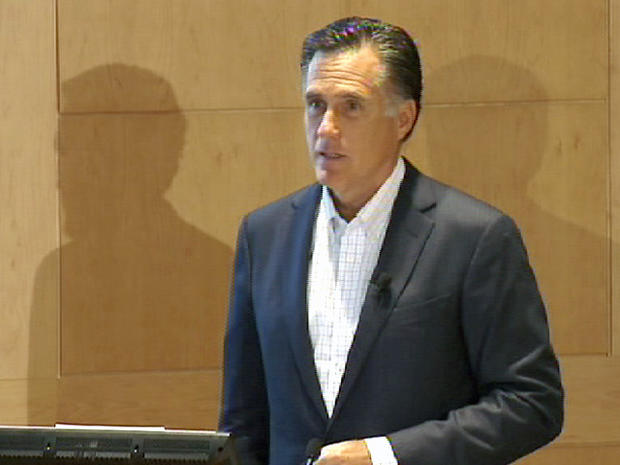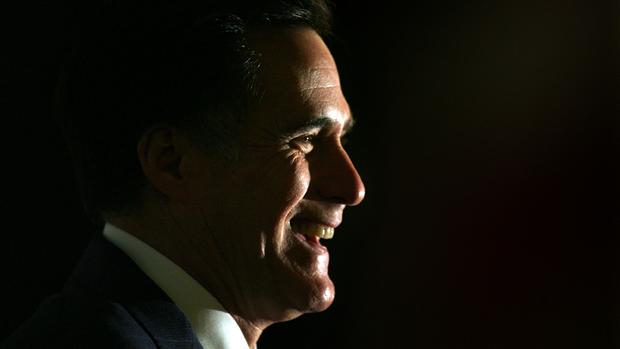Mitt Romney refuses to apologize for Massachusetts health care plan
In an attempt to address perhaps his greatest political vulnerability, likely 2012 Republican presidential candidate Mitt Romney on Thursday said there are clear differences between the health care law he signed into law as Massachusetts governor and the "Obamacare" federal health care law disdained by Republicans.
Romney said that while pundits have been pushing him to simply admit his decision to sign the Massachusetts law was a "boneheaded" mistake, he would not do so. That's because, he said, "it wouldn't be honest."
Signing the law, Romney said, "was right for the people of my state."
Yet he argued that what was right for his state is not necessarily right for the nation. Romney grounded his argument in the founding fathers' vision for America, saying they didn't want a "king-like structure" grounded in a central government but rather for Americans to have the "freedom to choose our life's course, our enterprises."
The founders, he said, chose for American power to be grounded in the states, and codified that impulse in the 10th Amendment.
"The Obama administration," he said, citing the health care law, "fundamentally doesn't believe in that American experiment." The administration "distrusts the idea that states are where the power of government resides," he added.
Romney said that "our plan was a state solution to a state problem, and his is a power grab by the federal government to put in a one sized fits all plan across the nation."
Romney, who has been stung by charges of flip-flopping in the past, said his federal health care proposal had not changed from 2008, when he last ran for president -- even though his decision to sign the law has seemingly gone from a political asset to a liability.
"The plan I'm going to describe for you is the same," he said. "I'm not adjusting the plan to reflect the political sentiment."
Speaking at the University of Michigan, Romney defended the individual mandate in the Massachusetts plan, saying it was necessary to address the "free rider problem" of state residents declining to buy health care and then showing up at hospitals for care, leaving taxpayers to foot the bill.
He cast the pre-mandate system as the "big government approach," since paying for care fell to taxpayers. He contrasted that with the mandate to buy insurance or pay a penalty, which he cast as the "personal responsibility" option.
Romney then offered the outlines of his federal health care proposal, which, he said, would start with an executive order on his first day as president to help states get waivers to opt-out of the federal health care law. Referring to slides, he said he would then look to "repeal and replace" that law with his proposal.
There are five planks in Romney's proposal. The first is to give more power to states through Medicaid block grants, more flexibility in dealing with the ill and uninsured and limits on federal standards.
The second is plank is to "empower individual ownership," in part by giving a tax deduction to those who buy their own insurance. The third is to "focus" federal regulation, partially by allowing people to purchase insurance across state lines.
The fourth is to limit medical malpractice lawsuits. And the fifth is to make health care more competitive in part through "co-insurance" products that give consumers more of a stake in the overall cost of their care.
Romney said that more specifics about the plan would be forthcoming. But he argued that overall it lowered costs and meant less government spending than the Obama plan, which he cast as a tax-raising, costly bureaucratic nightmare that forces an un-American federal mandate on the American people.
Rick Santorum, one of Romney's likely rivals, released a statement immediately following the speech deeming the Massachusetts health care law "the precursor to national socialized medicine."
"Both Romneycare and Obamacare infringe upon individual freedom and exponentially increase the government's healthcare cost burden," he said. "Romneycare has, in fact, not made healthcare better or saved costs in Massachusetts. It's done just the opposite. This is not a failure of execution, but a lack of foresight on Governor Romney's part to understand the implications of his policy proposals. We need leaders who believe in the American people again, not the power of government to solve our problems."
During a question and answer period following Romney's address, he said the Massachusetts law "wasn't perfect," adding that there were "a number of things" the state could have done differently. But he said he was proud that he signed a law that helped get residents insured and was in the interest of the people of Massachusetts.
In advance of the speech, which the Romney campaign billed as major, the conservative Wall Street Journal editorial page hammered the Massachusetts Republican on the issue, writing: "Mr. Romney now claims ObamaCare should be repealed, but his failure to explain his own role or admit any errors suggests serious flaws both in his candidacy and as a potential President."
Those on the left, meanwhile, pointed to Romney's past statements seemingly in support of a federal mandate, including a 1994 statement that he would back a federal bill that included a mandate. In 2007, Romney said that once states try out their own plans, "we'll end up with a nation that's taken a mandate approach."
The individual mandate is at the center of conservative Constitutional challenges to the health care law.



